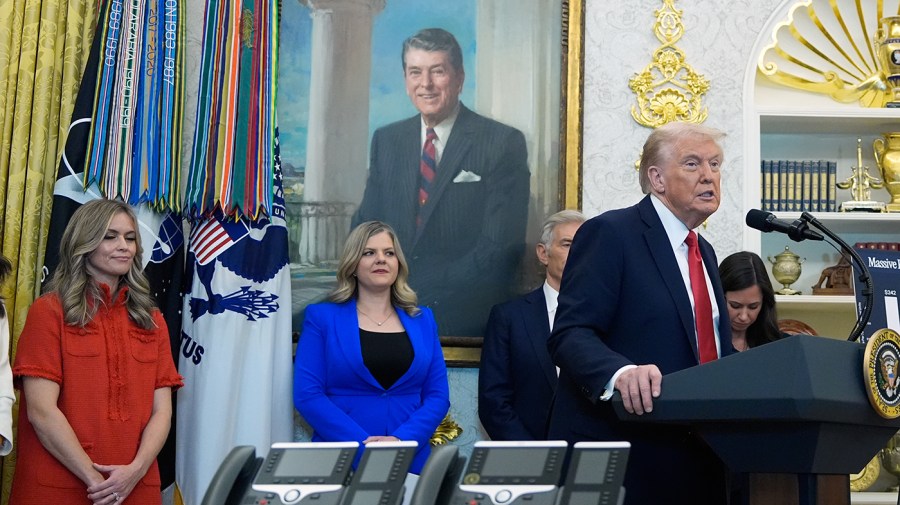Trump’s IVF moves: ‘Huge leap’ or ‘broken promises’?

President Trump’s dual-pronged action on expanding access to in vitro fertilization (IVF) is garnering mixed reactions from lawmakers, advocates and medical groups, with some calling it a step in the right direction, if only to start the conversation.
Speaking from the Oval Office on Thursday, Trump announced new federal guidance on insurance coverage for IVF services, as well as his administration’s latest deal with a drug manufacturer under his “most favored nation” pricing policy.
The updated guidance from the Department of Labor, the Treasury Department and the Department of Health and Human Services (HHS) would make opting in to fertility benefits similar to opting in for dental or vision benefits as part of an employer’s insurance plan.
EMD Serono, the manufacturer of commonly used infertility treatments like Gonal-F, announced it would be offering its “leading IVF therapies” at steep discounts. The company said in a press release that the agreement came with an exemption from Section 232 tariffs that the White House had threatened against pharmaceutical companies.
On the campaign trail, Trump — who called himself the “father of IVF” on Thursday — had vowed to make IVF available to everyone, either by the government funding it or by requiring insurers to cover it. The initiatives announced Thursday resemble neither of these plans.
Still, the announcement was well-received by some groups championing fertility services.
Moshe Margaretten, founder and president of Americans for IVF, called it a “huge leap forward in the fight to make fertility care affordable and accessible.”
“But as meaningful as this step is, we know our work is not finished. Indeed, the president said today that this is just the beginning,” Margaretten said. “We will continue working with the White House and Congress, advocating for further reforms until every family struggling with infertility can find the support and opportunity they deserve.”
Alabama Sen. Katie Britt (R) called the announcement the “most pro-IVF thing that any president in the history of the United States of America has done.”
Sean Tipton, chief advocacy and policy officer of the American Society for Reproductive Medicine, agreed with Britt’s assessment.
“But I think that indicates what a tremendously low bar that is. Because these policy announcements are not going to accomplish what the president said he wanted to accomplish, that is to make IVF available to everybody,” Tipton said.
He agreed that finances are a significant barrier to accessing IVF services, particularly in the U.S., but he wasn’t entirely sold on the plan requesting that employers consider covering fertility services for their employees.
“There are no sticks here. It’s all moderate carrots,” he said.
While acknowledging that a presidential endorsement of IVF coverage could go a long way, Tipton said this policy was “not nearly as valuable as a law,” and it’s unclear how many companies would actually be willing to cover the very costly procedure, with an IVF cycle costing between $15,000 and $20,000.
A reduction in the cost of Gonal-F is still significant, however, as the drug component of a cycle can cost between $5,000 and $6,000.
Sen. Elizabeth Warren (D-Mass.) blasted the nature of the policy, given that Congress is locked in a fight over ensuring continued health care coverage.
“It’s clear that Donald Trump lied when he told the American people he’d make IVF available to every family for free,” Warren said immediately after the announcement.
“Instead, Trump’s new genius plan is to rip away Americans’ health insurance and gut the CDC’s IVF team, then politely ask companies to add IVF coverage out of the goodness of their own hearts — with zero federal investment and no requirement for them to follow through. It’s insulting, and yet another one of Trump’s broken promises to American families,” she added.
Pushback from anti-abortion voices was also anticipated, given that unused embryos are regularly discarded or donated in the IVF process. Trump was asked about this anticipated criticism, which he dismissed by saying, “You can’t get more pro-life than this.”
“Any policy in this space, from the White House or Congress, must treat the lives of the smallest children in the highest regard,” Marjorie Dannenfelser, president of the anti-abortion group Susan B. Anthony Pro-Life America, said in a statement, reiterating her organization’s stance that “human embryos should not be destroyed.”
“We support focusing on restorative fertility treatments to help couples struggling with infertility, and urge high ethical and medical standards for the IVF industry,” she added. “Too often, the IVF industry is given blanket immunity — despite growing numbers of horror stories like rogue practitioners switching embryos, ignoring basic safety standards, or negligently destroying embryos.”
Granting embryos personhood was at the core of the lawsuit that pushed IVF into the national conversation last year when the Supreme Court of Alabama ruled that frozen embryos could be considered the same as children. This temporarily put IVF services in the state on pause, with clinics apprehensive of risking legal action.
Republican lawmakers found themselves in a uniquely difficult position: They concurred with the court’s findings while also being reticent to support blocking IVF services. Democrats, in turn, cited the ruling as an escalation of the overturning of Roe v. Wade, placing blame on Trump for nominating Supreme Court justices who helped overturn the landmark ruling.
EMILY’s List, a major Democratic group that backs female Democratic candidates who support abortion access, called it “another sorry proposal” from Trump.
“While Republicans pretend to care about women, they’re actively working to strip millions of women of their health insurance and push essential health care out of reach,” EMILY’s List President Jessica Mackler said. “Making IVF more accessible and affordable is going to rely on securing Democratic power by taking back Congress and electing women leaders across states who will deliver real solutions for these families.”